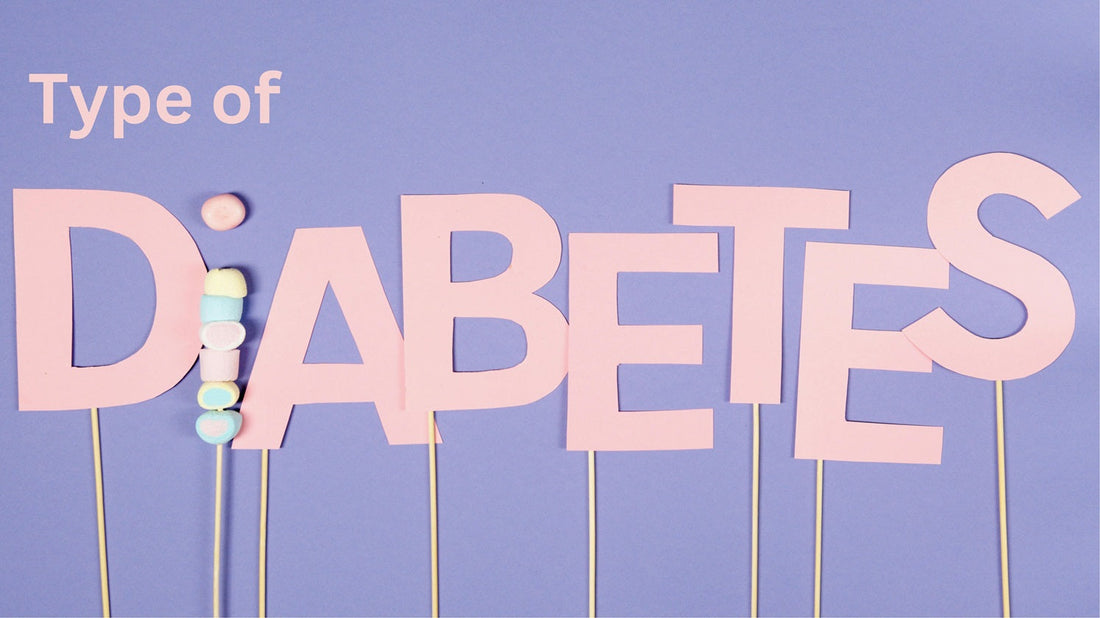Diabetes is a chronic health condition that impacts how the body utilizes glucose (sugar), as a primary source of energy. Diabetes is defined by a lack of insulin or low insulin utilization by the body. This causes blood sugar levels to rise, which, if not appropriately controlled, can result in serious health problems. Statistics show that over 422 million people worldwide suffer from diabetes with their number increasing continuously. Understanding the various types of diabetes is important for its effective control and prevention.
Type 1 diabetes, Type 2 diabetes, gestational diabetes, and prediabetes are the common types for diabetes. Each of the types has different causes, symptoms, and methods of therapy. By understanding types of diabetes, people can manage their disease more effectively by various approaches, including medications such as insulin therapy, or altering their lifestyles.
In the blog we will discuss about management and regulation of their diabetes, regardless of the disease's kind. The article will help you make careful choices regarding Type 1 diabetes medicines, Type 2 diabetes diet planning, and gestational diabetes control. Blood sugar monitoring, diabetes preventive measures, and the benefits of sugar care diet will also be shared at the end of this blog, Now lets start with diabetes types -
Type 1 Diabetes
Definition
Type 1 diabetes is an autoimmune disease, where the body attacks insulin-producing cells in the pancreas, resulting in lack of enough insulin production by the body, thus leading to rise in the blood sugar levels.
Causes
Autoimmune Response - In Type 1 diabetes, the immune system of the body destroys beta cells in the pancreas that produce insulin. Due to lack of these cells, the body is not able to manage blood sugar levels, leading to the need for insulin from outside sources.
Genetic Factors - The chances of developing Type 1 diabetes also include the family history of person as well as certain genetic markers. Although the probability of developing genetic markers is very less but it’s more frequent with individuals having diabetic family history.
Symptoms
Type 1 diabetes symptoms include:
- Increased Thirst: The presence of excess glucose in the blood leads to dehydration in the body, causing increased thirst.
- Frequent Urination: In order to filter out excess sugar, the kidneys have to function overtime leading to more frequent urination.
- Unexplained Weight Loss: Weight loss is likely to occur in individuals because the body starts to break down muscle and fat for fuel since it can’t use glucose for energy.
Management and Control
Insulin Therapy - Insulin therapy is the important for individuals as they are dependent on daily insulin injections or insulin pumps to regulate their blood sugar levels.
Monitoring Blood Sugar - Levels Regular monitoring with blood glucose meters and continuous glucose monitors (CGMs) is important to manage Type 1 diabetes in order to track real-time blood sugar.
Healthy Diet and Exercise - Taking of nutritious diet and regular physical activity helps to control blood sugar levels. Low-glycemic (GI) foods (example - millets, fiber-rich vegetables etc.) helps to prevent sugar spikes.
Type 2 Diabetes
Definition
In type 2 diabetes, the body becomes resistant to insulin or doesn’t produce enough insulin to regulate blood sugar level effectively. This type is the most prevalent form amongst the people which develops slowly over time.
Causes
Insulin Resistance - In type 2 diabetes, the cells don't respond to insulin efficiently due to insulin resistance. So, the pancreas produce more insulin, gradually wearing it out.
Lifestyle Factors - Type 2 diabetes is also the result of obesity, sedentary lifestyle, and poor dietary habits. A inactive routine along with with a processed foods high in sugar is a major contributing factor.
Symptoms
Type 2 diabetes symptoms include:
- Fatigue: Individuals mostly feel tired due to high blood sugar levels which makes it difficult for cells to get the desired energy for proper functioning.
- Blurred Vision: The vision becomes blurred due to swelling in the eye lens due to high blood sugar.
- Slow-Healing Sores: The body is not able to heal wounds due to poor blood circulation.
Management and Control
Medications Medicines - like Metformin are commonly recommended in order to improve insulin sensitivity and lower sugar levels.
Weight Management - Proper weight management through healthy diet and regular exercise can improve insulin sensitivity and help to control Type 2 diabetes.
Regular Physical Activity - Physical activity (walking, swimming etc.) can help to reduce blood sugar and improve overall health. Even moderate exercise significantly improve insulin sensitivity.
Gestational Diabetes
Definition
During pregnancy, when the body is unable to produce required insulin to manage increased glucose levels, gestational diabetes occurs. Gestational diabetes increases the mother’s risk of developing Type 2 diabetes thereafter although, the problem resolves after chiildbirth.
Causes
Hormonal Changes During - Pregnancy Hormonal changes, especially those produced by the placenta, makes the body less sensitive to insulin, which increases blood sugar levels.
Genetic Predisposition - Women with a diabetic family history or who are overweight/ obese before pregnancy have more chances of developing gestational diabetes.
Symptoms
Gestational diabetes is mostly asymptomatic and usually detected through routine check-up during pregnancy.
Management and Control
Dietary Modifications - Taking a healthy nutritious low sugar and refined carbs diet l helps to manage blood sugar during pregnancy.
Regular Monitoring of Blood Sugar - Women with gestational diabetes must have regular check on their blood sugar levels to assure they remain within the target zone.
Insulin Therapy - if Necessary In some cases, insulin therapy might be required to regulate gestational diabetes because diet and exercise may alone may not serve the purpose.
Other Rare Types of Diabetes
Maturity-Onset Diabetes of the Young (MODY)
MODY is a rare diabetic form, resulting from a single gene mutation. It is prevalent particularly in young people and has characteristics of both Type 1 and Type 2 diabetes.
Latent Autoimmune Diabetes in Adults (LADA)
LADA is a form of Type 1 diabetes that occurs in adulthood slowly. Like Type 1 diabetes, it involves the immune system attacking insulin-producing cells, but it develops more slowly.
Type 3c Diabetes
Type 3c Diabetes is caused by damage to the pancreas due to pancreatitis, surgery, or pancreatic cancer etc., resulting in lack of insulin production in the body.
Steroid-Induced Diabetes
Use of steroids like corticosteroids for a long period can cause increased blood sugar levels, leading to steroid-induced diabetes.
Prevention and Risk Factors
Lifestyle Factors
Diet
Unhealthy diet intake high in refined sugars and fats increases the proneness to diabetes. A balanced healthy diet with whole grains, millets, green vegetables low in GI, Low GI fruits, lean proteins, and healthy fats helps reduce the chances of the disease.
Physical Activity
Sedentary lifestyle is a major factor for diabetes. Physical activities like walking, cycling, or swimming etc. helps to improve insulin sensitivity and maintain your health properly.
Genetic Factors
Diabetic family history increases your risk of developing the disease. While genetics can’t be changed, the required preventive measures for diet and lifestyle habits can be made accordingly so that the disease conditions can be prevented before hand knowing your family history
Environmental Factors
The factors, like routine health check-up, stress conditions, and social environment, can also influence the risk of diabetes. Consuming unhealthy food and lack of healthcare services can increase the risk of developing diabetes.
Preventive Measures
Regular Health Check-Ups
Routine check-ups that include blood sugar test can help to detect diabetes early, allowing for timely preventive measures.
Maintaining a Healthy Weight
Proper weight management is one of the most effective ways to prevent Type 2 diabetes. Routine exercise and a balanced nutritious diet are key factors helpful for this.
Managing Diabetes Effectively
1. Diet and Nutrition
Balanced Diet Importance
A well-balanced diet is most crucial to manage diabetes. It helps to regulate blood sugar and provide required nutrients for overall growth of body.
Recommended Foods
- Whole Grains: Foods like whole wheat, brown rice, and Sugar Care atta are useful to manage blood sugar due to their low glycemic index (GI).
- Lean Proteins: Fish, chicken, and plant-based proteins (beans and tofu) provide desired nutrients without raising blood sugar.
- Vegetables and Fruits: Non-starchy vegetables and low-glycemic fruits like berries help to balance blood sugar levels.
Foods to Avoid
- Sugary Beverages: Soft drinks and sugary juices increase blood sugar levels.
- Refined Carbs: White bread and pasta need to be replaced with whole grains.
- Excessive Fats: Saturated and trans fats increase the chances of heart disease, one of the complication of diabetes.
2. Physical Activity
Benefits of Regular Exercise
Regular exercise improves insulin sensitivity, thus maintaining healthy weight, and lowering blood sugar levels.
Types of Exercises
- Aerobic Activities: Walking, swimming, and cycling are best option for heart health and blood sugar regulation.
- Strength Training: Resistance exercises improve muscle mass and the body can use insulin more effectively.
- Flexibility Exercises: Stretching and yoga exercises improve mobility and lower the chances of injury, particularly for those with diabetes-related complications.
3. Medications and Insulin Therapy
Overview of Common Medications
Oral medications ( like Metformin) help to lower blood sugar levels and improve the body’s insulin response.
Insulin Types and Usage
- Rapid-Acting Insulin: Works quickly to control blood sugar levels post meals.
- Long-Acting Insulin: Maintains steady insulin levels throughout the day and night to prevent blood sugar fluctuations.
4. Monitoring Blood Sugar Levels
Importance of Regular Monitoring
Frequent monitoring helps to keep blood sugar within the target zone, preventing complications.
Tools and Techniques
- Glucose Meters: Provide quick and approprite blood sugar readings.
- Continuous Glucose Monitors (CGMs): Offer real-time glucose readings, allowing for more refined tracking and management of eating choices.
5. Controlling Diabetes Complications
Heart Disease
Higher blood sugar levels increase the chances of heart disease. Routine body check-ups and a heart-healthy diet are important.
Kidney Damage
Diabetes can also damage the kidneys over time. Checking of blood pressure and maintaining normal blood sugar levels help to reduce kidney complications.
Eye Problems
Diabetes can also give rise to diabetic retinopathy, causing vision issues or blindness. Routine eye check-ups are important.
Nerve Damage
High blood sugar can also damage nerves, particularly in the extremities. Managing blood sugar levels and regular foot checks helps to prevent furthur complications.
Preventive Strategies
Regular medical check-ups, access to treatment plans, and following a healthy lifestyle are important factors to prevent diabetes-related health problems.
Sugar Care Diet Chart: Your Ultimate Diabetes Management Tool
Managing diabetes effectively requires careful diet intake, and the Sugar Care Diet Chart is designed to solve that problem.
Introduction to Sugar Care Diet Chart
Our Sugar Care Diet Chart provides personalized diet plans that helps to manageblood sugar while ensuring healthy nutrition profile.
Benefits
- Simplifies Meal Planning: Our diet chart makes it every simple to choose meals that align with your daily routine.
- Ensures Balanced Nutrition: Focuses on food items that manages blood sugar while providing essential vitamins and minerals.
How to Use It
The Sugar Care Diet Chart can offers meal suggestions and portion control that make diabetes management quick and simple.
Control your diabetes with us! Download our exclusive Sugar Care Diet Chart to start your journey towards a healthier lifestyle.”
Wrap Up
Understanding the different types of diabetes and their respective management strategies is important for a healthier life. Balanced meal intake, routine physical activity, proper medicine, and health check-up are essential for the management of Type 1, Type 2, or gestational diabetes. Sugar Care Diet Chart helps to manage diabetes through meal plans that make meal planning easy.
Type of Diabetes FAQs
-
What is the difference between Type 1 and Type 2 diabetes?
Type 1 is an autoimmune condition where the body is not able to produce insulin, while Type 2 is when the body becomes resistant to insulin or is not able to use it properly. -
Can Type 2 diabetes be prevented with lifestyle changes?
Yes, routine physiscal activity, a healthy diet, and weight management can help prevent Type 2 diabetes. -
What are the early signs of diabetes to watch out for?
Common signs include excessive thirst, frequent urination, fatigue, and unexplained weight loss. -
How often should I monitor my blood sugar levels?
It depends on your doctor's advice, but typically, people with diabetes check it 1-4 times a day. -
What are the best exercises for managing diabetes?
Aerobic activities like walking, swimming, and cycling, along with strength training, are effective for managing diabetes. -
Is gestational diabetes permanent after pregnancy?
No, it usually resolves after childbirth, but it increases the risk of developing Type 2 diabetes later. -
What dietary changes are most effective for controlling diabetes?
Focus on low-glycemic index foods, whole grains, lean proteins, and reducing added sugars and processed carbs. -
How does insulin therapy work for Type 1 diabetes?
Insulin therapy helps regulate blood sugar by providing the insulin the body no longer produces. -
Can diabetes lead to other health complications?
Yes, uncontrolled diabetes can lead to heart disease, kidney damage, nerve problems, and vision issues. -
What should I do if I experience symptoms of high blood sugar?
Test your blood sugar, stay hydrated, and contact your healthcare provider if it remains high.


